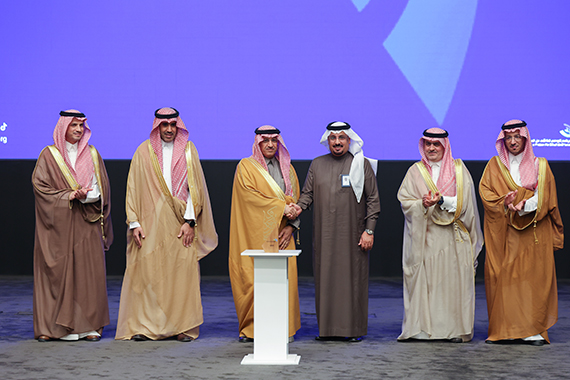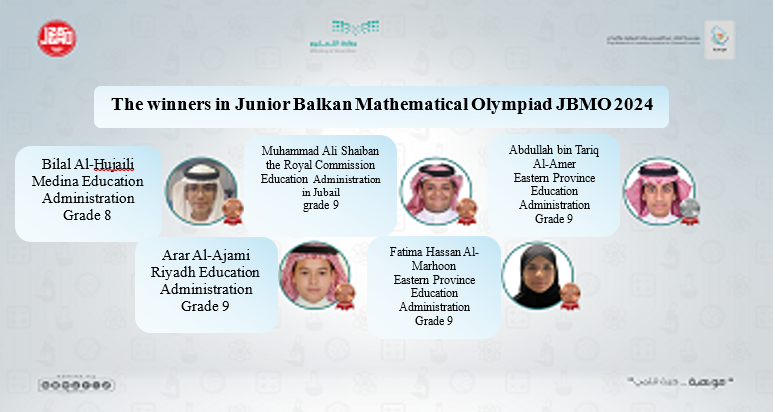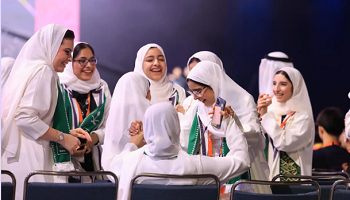Trial version. To return to the previous site, Click here
During a Ceremony Attended by the Minister of Education, the identification of 29,000 Gifted Students in the Kingdom Was Officially Announced.

08 Mar 2025
The Ministry of Education and the King Abdulaziz and His Companions Foundation for Giftedness and Creativity (Mawhiba) announced the results of the 15th edition of Tthe National Program for Gifted Identification, during a ceremony held today at the Ministry's auditorium under the patronage and in the presence of H.E. Minister of Education, Mr. Yousef Al-Benyan.
This year, the annual program—organized by Mawhiba in strategic collaboration with the Ministry of Education and the Education and Training Evaluation Commission (ETEC) (via the National Center for Assessment)—attracted 88,431 registrants from across Saudi Arabia, with 79,965 students successfully completing the MMCAT.
The program, in which students took the Mawhiba Multiple Cognitive Aptitude Test (MMCAT) —considered the first step in a gifted student’s journey and the gateway to most of Mawhiba’s services and programs—aims to identify gifted students in the fields of science and technology, develop an integrated ecosystem and comprehensive methodology for gifted identification, ensure fairness and equity in the selection process, and guide students toward the most suitable enrichment programs.
Among its objectives is the establishment of a detailed national database of gifted students in Saudi Arabia, the promotion of societal understanding of their unique attributes and the importance of recognizing them, and the advancement of academic research and Arabic literature related to gifted identification.
This announcement is the culmination of joint efforts between the Ministry of Education, Mawhiba, and the Education and Training Evaluation Commission. These efforts seek to discover, nurture, and develop the capabilities of gifted students and provide them with the appropriate environment for innovation and creativity, with the goal of enabling them to achieve academic leadership and raise the Kingdom's profile globally.
Data released by Mawhiba Foundation revealed that the number of students discovered this year reached 29,133, including 2,045 exceptional talents and 27,088 gifted individuals, in addition to 37,479 promising students. They are being nominated for programs and services based on program criteria and requirements. They will join their colleagues from previous years, bringing the total number of students discovered since the program's launch to more than 244,000 gifted individuals.This year, 27,024 students underwent the MMCAT at Level 1, which includes Grades 3, 4, and 5. At Level 2, which covers Grades 6, 7, and 8, 27,650 students participated. Meanwhile, Level 3—comprising Grades 9and 10—recorded 25,291 students among the total test takers.
The MMCAT covers several areas, including cognitive flexibility, mathematical and spatial reasoning, scientific and mechanical reasoning, linguistic reasoning, and reading comprehension. Students can take The MMCAT in both Arabic and English via more than 100 computerized sites for targeted students from Grade 3 to Grade 10. The number of students who have taken the test over the course of 15 years has reached more than 690,000 students. The National Program for Gifted Identification acts as a gateway to access research and enrichment programs. It assists in the qualification, training, and development stages after discovery, alongside Mawhiba classes and various local and international programs conducted annually or during the summer. These initiatives are implemented in partnership with Mawhiba, multiple ministries, government sectors, and major companies.
Mawhiba has invested in developing specialized scientific curricula and numerous enrichment activities in the fields of science, technology, engineering, mathematics, and other fields, offering these to students at allacademic levels in partnership with several international expertise centers, in accordance with the latest global practices.
Did you benefit from the information provided on this page?
visitors liked this page


